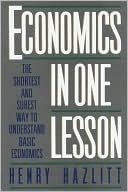More on this book
Community
Kindle Notes & Highlights
Started reading
June 9, 2022
The bad economist sees only what immediately strikes the eye; the good economist also looks beyond. The bad economist sees only the direct consequences of a proposed course; the good economist looks also at the longer and indirect consequences. The bad economist sees only what the effect of a given policy has been or will be on one particular group; the good economist inquires also what the effect of the policy will be on all groups.
The art of economics consists in looking not merely at the immediate but at the longer effects of any act or policy; it consists in tracing the consequences of that policy not merely for one group but for all groups.
that the bad economists present their errors to the public better than the good economists present their truths.
all government expenditures must eventually be paid out of the proceeds of taxation; that inflation itself is merely a form, and a particularly vicious form, of taxation.
But the larger the percentage of the national income taken by taxes the greater the deterrent to private production and employment.
This is only another way of saying that the government lenders will take risks with other people’s money (the taxpayers’) that private lenders will not take with their own money.
There is a strange idea abroad, held by all monetary cranks, that credit is something a banker gives to a man. Credit, on the contrary, is something a man already has.
He is merely exchanging a more liquid form of asset or credit for a less liquid form.
The proposal is frequently made that the government ought to assume the risks that are “too great for private industry.” This means that bureaucrats should be permitted to take risks with the taxpayers’ money that no one is willing to take with his own.
It would increase the demand for socialism: for, it would properly be asked, if the government is going to bear the risks, why should it not also get the profits?
private loans will utilize existing resources and capital far better than government loans.
Government loans, in short, as compared with private loans, will reduce production, not increase it.
When the government makes loans or subsidies to business, what it does is to tax successful private business in order to support unsuccessful private business.


